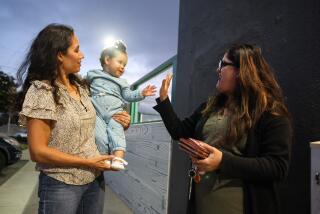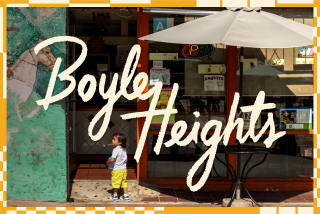BOYLE HEIGHTS : Bilingual Volunteers Ease Patients’ Pain
- Share via
For seven years, Rudy Aguilar has trekked twice a week from his Hacienda Heights home to County-USC Medical Center to help patients understand their doctors.
Aguilar, a 63-year-old retiree, translates from Spanish to English and vice versa in the diabetes clinic, helping patients, most of them Latino, understand their doctors’ instructions.
As with many volunteer translators, Aguilar’s job has become more than just words passed between patient and doctor. The volunteers are a source of comfort for people in pain who may speak little or no English and who need to communicate with doctors and nurses who do not speak their language, said Marjorie Dolinski, director of volunteers at General Hospital in the county complex.
“Our volunteers are usually very trusted by our patients,” Dolinski said, adding that translators often help make appointments, give directions and make certain the patients understand their prognosis and treatment plan.
Aguilar also educates patients, many of whom have their own myths and folk cures, about diabetes. Latinos and Native Americans are particularly susceptible to the disease, which when properly treated is manageable.
One elderly patient had his insulin cut off at night by his daughter, who told Aguilar that she did so because her father was going blind. She thought the insulin, not the disease, was responsible.
Aguilar said that despite his pleadings to resume the insulin, the daughter refused, and her father was dead within two months.
“Our people (Latinos) don’t think that insulin is a part of life,” Aguilar said. “Diabetes attacks the eyesight, the feet, the heart, the liver and kidneys. Many people have had their feet and legs amputated.”
Waiting-room gossip can sometimes scare patients into thinking that insulin will do them more harm than good. Occasionally, blood-sugar levels are high enough to warrant emergency treatment.
“That’s the way things are here in the clinic,” Aguilar said. “I’m coarse as hell when I need to be coarse, only because our people have to be educated.”
The hospital relies on adults fluent in Spanish, Tagalog, Korean, Armenian and Chinese to help the patients, Dolinski said. Only about 25 of the more than 400 volunteers are translators, she said, and more are needed.
Volunteers do not need to know medical terms but must undergo four hours of training and a TB test. Dolinski asks volunteers to commit to 100 hours of service.
Information: (213) 226-6945.
More to Read
Sign up for Essential California
The most important California stories and recommendations in your inbox every morning.
You may occasionally receive promotional content from the Los Angeles Times.













